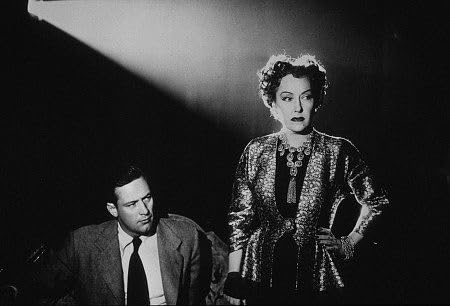
These past few months have witnessed my free-fall down another cinematic rabbit hole. Fresh off the back of the mystique-led films of Alfred Hitchcock, I made a U-turn and ended up in the hopeless, but equally genius drama-comedies of Billy Wilder films. The impeccable blend of drama and humour from most of his films has not quite been matched by any work before or after them, especially their “meta” edge. Their cinematography is only matched by the best of the best “Golden Age” Hollywood films. Still, perhaps the most powerful angle that every film exhibits has nothing to do with genre or visuals but, rather, the writing. In each of the four Billy Wilder films I have outlined, the story proves that evil is solely fostered by individuals’ careers and incessant greed.
Double Indemnity (1944)
This movie follows unmatched insurance salesman Walter Neff and his relationship with an unusual seductress and proud anklet owner called Phyllis Dietrichson. Mrs. Dietrichson’s dream is to (naturally) “get rid” of her husband and collect subsequent funds supplied by her husband’s life insurance.
What is Walter Neff’s reason for acting as an accessory to a murder scheme poised to financially hurt his place of employment? Well, his love of Mrs. Dietrichson, of course, but–albeit to a lesser extent–his desire for superiority, especially over his mentor and superior, Barton Keyes. Neff’s scheme to pull off the oh-so-popular 40s and 50s Hollywood trope of the “perfect murder” is more than enough for him to feel as if he is superior where his place of employment could not by means of a promotion, et cetera.
Sunset Boulevard (1950)
Morbid and uneasy is where this film thrives. On an aging silent-era Hollywood actor called Norma Desmond trying to remain relevant with the help of her new “friend” Joe Gillis, the movie swiftly defies expectations even in the very beginning. The opening shot–Gillis submerged in a pool–sets the tone for the entire film.
As the film progresses, one realises Norma Desmond’s suicidal tendencies coupled with her desperation and subsequent hallucinations. Risk, already playing a major theme in the film, is dialed up to eleven. At this point, and adding Desmond’s fostered attachment to Gillis, it’s fairly easy to predict what comes next. Desmond–now equipped with a gun owned by Gillis–shoots him after he sets off to leave her. The uneasy theme of the film, constantly strengthening throughout, pays off in this full-circle moment. Of course, at the heart of it, a fading film star who was desperate to get her career back.
Ace in the Hole (1951)
Perhaps the most brusque or even the best example of this phenomenon would be 1951’s Ace in the Hole (or, previous to 2007, The Big Carnival). The story follows one Chuck Tatum in his quest to climb back up the corporate ladder he previously fell backwards on. He takes up a newspaper job in Albuquerque and waits longingly for a break that seems to never come. Finally, it comes in the form of a man buried alive in an old Native American cave. For several days, he milks the story–makes it a sensation–in hopes of an offer from his favorite city–New York. The catch? He didn’t have to wait that long.
Tatum’s desire to relish his break lead him to disregard the risk that the man who was trapped in the cave–Leo Minosa–may die if not rescued in a timely manner. This lapse of judgement turns what could’ve been a serious affair into a spectacle. In an unusually dystopian directorial choice, Wilder turns the site into a “carnival” of sorts, with a Ferris Wheel, music shows, et cetera. Fueled by greed and the career benefits to come, Tatum and Minosa’s unfaithful wife lean into the event. This twisted show ends abruptly when Tatum reveals that Minosa had died. Tatum’s career aspirations had killed a man and, accordingly, his career followed suit.
The Apartment (1960)
My favorite of the four, 1960’s The Apartment depicts C.C. Baxter and his efforts to–once again–climb the corporate ladder. This time, though, he approaches the daunting task quite differently from his Wilder-directed peers. His renting out his apartment to his superiors for time with their…mistresses is eventually what sees him to working alongside the top position of the company.
And of course, as with all of the other films on the list, Baxter’s breakthrough plan (almost) kills someone. One of his married superiors conflicts with one of their mistresses and causes her (namely Kubelik) to overdose on sleeping pills. Eventually Kubelik survives thanks to the combined efforts of Baxter and his neighbors. After all The Apartment is a comedy, not a noir.
Not one of Wilder’s films is safe from this unfortunate truth, with even 1959’s Some Like it Hot (once again, a comedy) having been slightly influenced by it. It seems that we’ve always felt work the root of evil, after all. Even so, Wilder does a spectacular job attaching this underlying truth to a story that is unique, fun, and truly unforgettable each and every time.